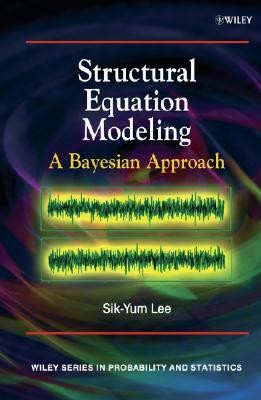
- We will send in 10–14 business days.
- Author: LEE
- Publisher: John Wiley & Sons
- ISBN-10: 0470024232
- ISBN-13: 9780470024232
- Format: 16.4 x 23 x 3 cm, kieti viršeliai
- Language: English
- SAVE -10% with code: EXTRA
Reviews
Description
***Winner of the 2008 Ziegel Prize for outstanding new book of the year***Structural equation modeling (SEM) is a powerful multivariate method allowing the evaluation of a series of simultaneous hypotheses about the impacts of latent and manifest variables on other variables, taking measurement errors into account. As SEMs have grown in popularity in recent years, new models and statistical methods have been developed for more accurate analysis of more complex data. A Bayesian approach to SEMs allows the use of prior information resulting in improved parameter estimates, latent variable estimates, and statistics for model comparison, as well as offering more reliable results for smaller samples.
Structural Equation Modeling introduces the Bayesian approach to SEMs, including the selection of prior distributions and data augmentation, and offers an overview of the subject's recent advances.
- Demonstrates how to utilize powerful statistical computing tools, including the Gibbs sampler, the Metropolis-Hasting algorithm, bridge sampling and path sampling to obtain the Bayesian results.
- Discusses the Bayes factor and Deviance Information Criterion (DIC) for model comparison.
- Includes coverage of complex models, including SEMs with ordered categorical variables, and dichotomous variables, nonlinear SEMs, two-level SEMs, multisample SEMs, mixtures of SEMs, SEMs with missing data, SEMs with variables from an exponential family of distributions, and some of their combinations.
- Illustrates the methodology through simulation studies and examples with real data from business management, education, psychology, public health and sociology.
- Demonstrates the application of the freely available software WinBUGS via a supplementary website featuring computer code and data sets.
Structural Equation Modeling: A Bayesian Approach is a multi-disciplinary text ideal for researchers and students in many areas, including: statistics, biostatistics, business, education, medicine, psychology, public health and social science.
EXTRA 10 % discount with code: EXTRA
The promotion ends in 22d.21:18:46
The discount code is valid when purchasing from 10 €. Discounts do not stack.
- Author: LEE
- Publisher: John Wiley & Sons
- ISBN-10: 0470024232
- ISBN-13: 9780470024232
- Format: 16.4 x 23 x 3 cm, kieti viršeliai
- Language: English English
Structural equation modeling (SEM) is a powerful multivariate method allowing the evaluation of a series of simultaneous hypotheses about the impacts of latent and manifest variables on other variables, taking measurement errors into account. As SEMs have grown in popularity in recent years, new models and statistical methods have been developed for more accurate analysis of more complex data. A Bayesian approach to SEMs allows the use of prior information resulting in improved parameter estimates, latent variable estimates, and statistics for model comparison, as well as offering more reliable results for smaller samples.
Structural Equation Modeling introduces the Bayesian approach to SEMs, including the selection of prior distributions and data augmentation, and offers an overview of the subject's recent advances.
- Demonstrates how to utilize powerful statistical computing tools, including the Gibbs sampler, the Metropolis-Hasting algorithm, bridge sampling and path sampling to obtain the Bayesian results.
- Discusses the Bayes factor and Deviance Information Criterion (DIC) for model comparison.
- Includes coverage of complex models, including SEMs with ordered categorical variables, and dichotomous variables, nonlinear SEMs, two-level SEMs, multisample SEMs, mixtures of SEMs, SEMs with missing data, SEMs with variables from an exponential family of distributions, and some of their combinations.
- Illustrates the methodology through simulation studies and examples with real data from business management, education, psychology, public health and sociology.
- Demonstrates the application of the freely available software WinBUGS via a supplementary website featuring computer code and data sets.
Structural Equation Modeling: A Bayesian Approach is a multi-disciplinary text ideal for researchers and students in many areas, including: statistics, biostatistics, business, education, medicine, psychology, public health and social science.


Reviews